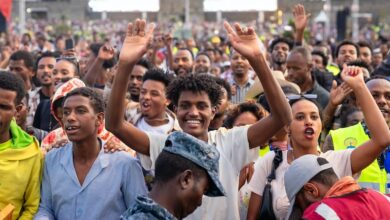Syrian death toll climbs, many seek help in Israel
JERUSALEM, Israel – Aerial and artillery bombardment by Syrian President Bashar al-Assad’s forces thisweek have killed more than 150 people and injured some 390, including children, the BBC quoted the Syrian Observatory for Human Rights.
In the first 48 hours since the onslaught began, the death toll neared 250, 58 of them children, with another 1,000 wounded. More recent numbers are unclear.
Many desperate Syrians are making the treacherous journey to Syria’s border with Israel. There, under cover of darkness and out of sight of television cameras, Israeli soldiers hustle the injured into Israel to be treated by Jewish doctors. It is a little known humanitarian effort that Israel has provided to anyone seeking medical treatment that makes it to its borders since the beginning of the Syrian civil war.
The latest assault on the eastern Ghouta area, a suburb of Damascus the government views as the last major “rebel” stronghold. The attacks, which began Sunday evening, also targeted the civilian infrastructure, including roads, residential neighborhoods, hospitals and other medical facilities and food supplies.
enforce but never did, US UN Ambassador Nikki Haley told Security Council members last week.
Two weeks ago, opposition forces reported another 230 fatalities from air and artillery strikes, among them dozens of children.
Russian Foreign Minister Sergei Lavrov reportedly told Russian media the devastation reports are “hyped.” He said the assault is “in keeping with the existing agreements [and] the fight against terrorism cannot be restricted.”
“In the UN, the topic of humanitarian problems in the eastern Ghouta and Idlib is being actively hyped up,” the BBC quoted Lavrov as saying. Russia blamed “extremists” for the carnage and said the month-long humanitarian ceasefire called for by the UN would not change anything.
At the Munich Security Conference last weekend, US National Security Advisor H.R. McMaster said it’s time for the international community to hold the Assad regime responsible for its use of chemical weapons against the Syrian people.
“Public accounts and photos clearly show that Assad’s chemical weapons use is continuing,” McMaster told conference participants on Saturday, Reuters reported.
“It is time for all nations to hold the Syrian regime and its sponsors accountable for their actions and support the efforts of the Organization for the Prohibition of Chemical Weapons.”
Meanwhile, Israel Defense Forces (IDF) Maj.-Gen. Nitzan Alon said Iran and its Lebanese proxy, Hezbollah, are being “freed up” to play an increasing role in Syria’s future. Alon said war in the coming year is increasingly probable.
Next month marks seven years since the start of the Syrian Civil war, which began with social protests against the Assad regime.
Alon said Iran could potentially tap thousands of jihadists to attack Israel along its northern and southern borders.
“War with Hezbollah could bring in other actors who we’d need to fight,” the Jerusalem Post quoted Alon’s remarks to Army Radio. ‘Iran won’t hold itself back in Gaza. It wants to pay for its interests on the northern border in Palestinian blood.”
Hezbollah chief Sheikh Hassan Nasrallah said the next war with Israel would open the floodgates for thousands of Shi’ite fighters from across the Islamic world to fight the Jewish state.
In the years following the 2006 Second Lebanon War, Hezbollah – in contravention of the ceasefire imposed by the UN – systematically embedded its terror infrastructure below the Litani River and more than tripled its missile cache.

The IDF keeps a close watch on the terror group’s movements, from time to time launching covert airstrikes on Iranian convoys transporting missiles and other war materiel across Syria to Lebanon.
Ten days ago in the most serious confrontation to date, Israel destroyed a drone launched by Iranian militias into its airspace and destroyed the command center that launched it.
Syria followed with at least 20 anti-aircraft missiles against Israel, downing an F-16 fighter. Israel then struck 12 targets inside Syria, including four Iranian sites.
Both the pilot and navigator ejected from their aircraft. The pilot, who sustained more serious injuries, has been released from the hospital to recuperate. The navigator returned to his squadron on Monday.






